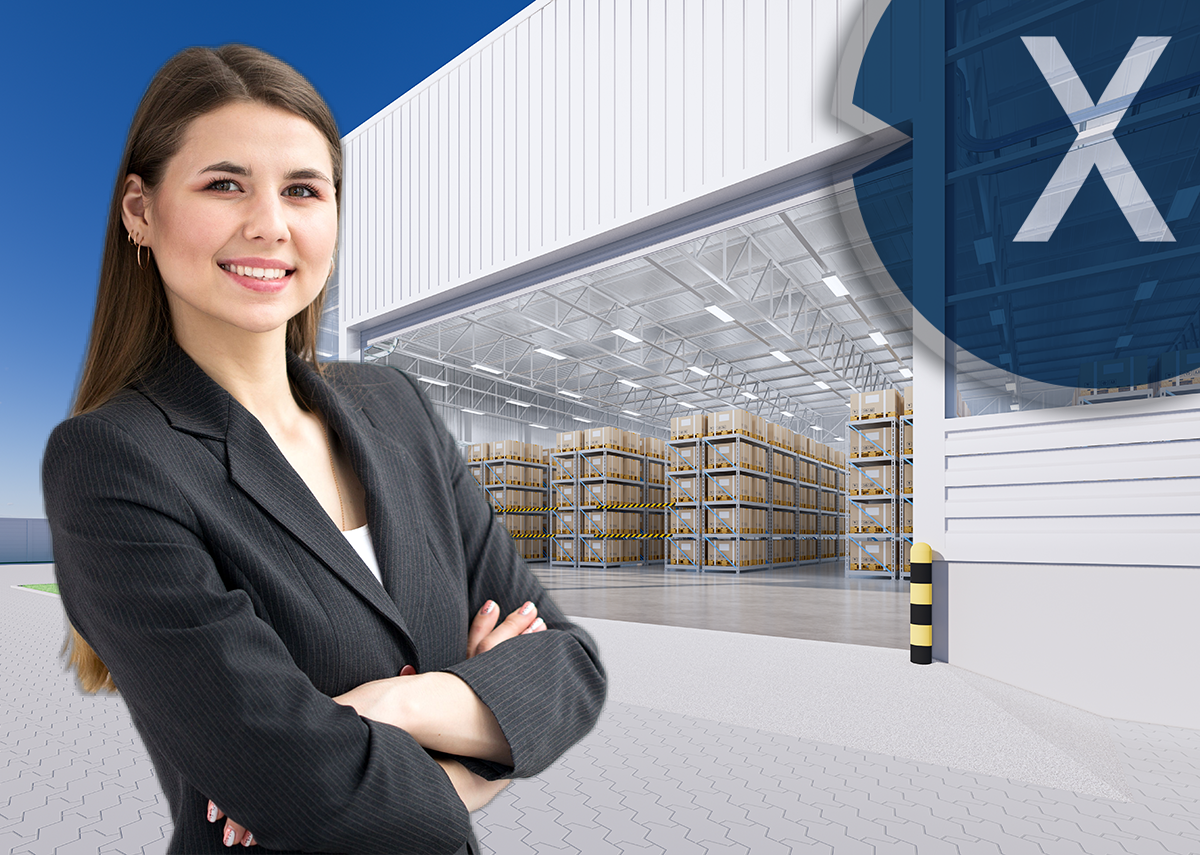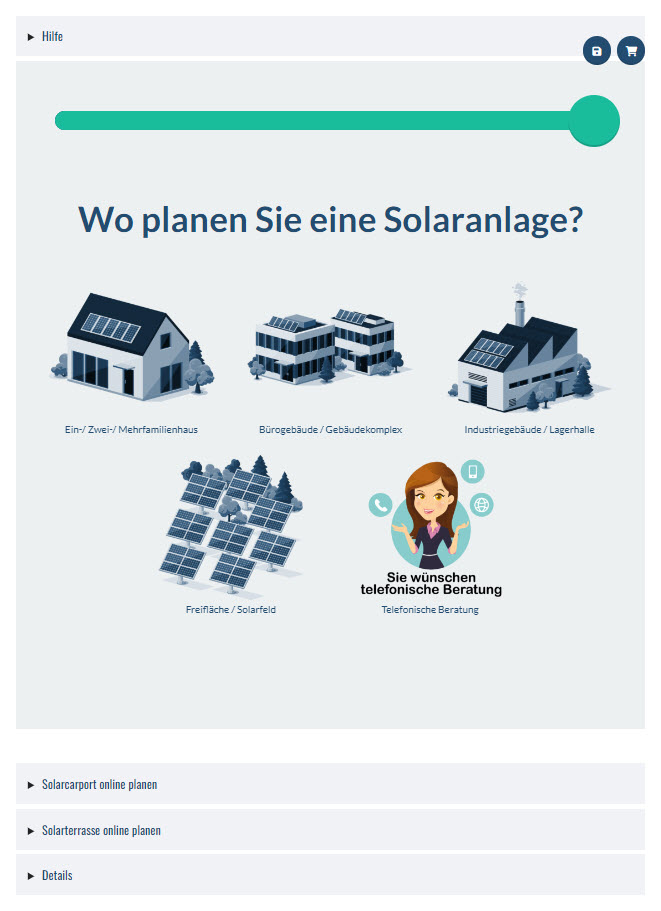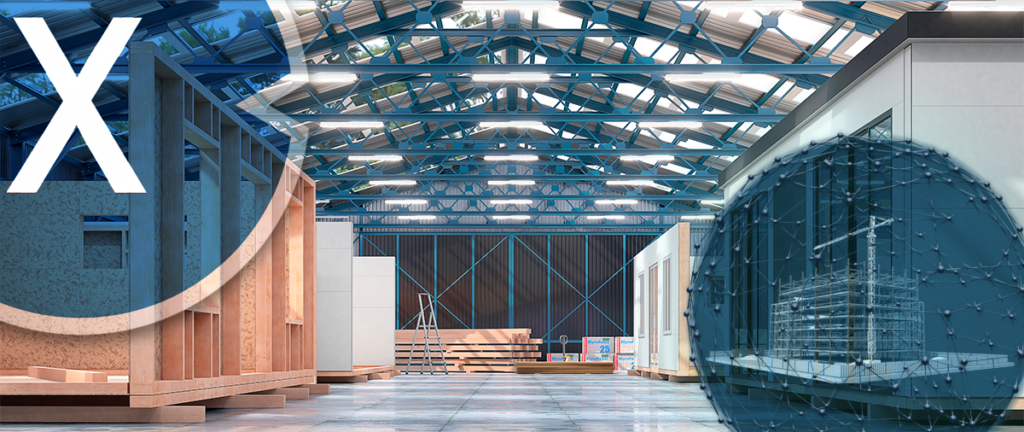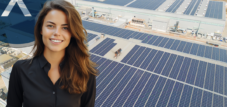Energy-efficient new construction or energy-efficient renovation of industrial properties – construction company & solar company for commercial and logistics halls and buildings
Language selection 📢
Published on: August 16, 2023 / Update from: August 16, 2023 - Author: Konrad Wolfenstein

Energy-efficient new construction or energy-efficient renovation of industrial properties – Image: Xpert.Digital
Logistics 2.0: The symbiosis of construction professionals and solar companies for energy-efficient warehouse and office structures in the area of industrial real estate
➡️ Attention! If there is a lack of roof stability for photovoltaic systems, we have special solutions! ⬅️
The ever-growing importance of environmental awareness and sustainability has also reached the construction industry. Particularly in the area of logistics properties, such as warehouses and office buildings, the question arises as to whether it makes more sense to rely on energy-efficient renovation or to build new energy-efficient buildings. Both construction companies with their know-how in the construction of buildings and solar companies with their expertise in the use of renewable energy sources play a crucial role. Below we take a closer look at this exciting topic.
The importance of energy efficiency in the logistics industry
The logistics industry is a key factor in the global economy. However, the increasing demand for efficient goods transport and management is leading to increased energy consumption, which is often accompanied by high environmental impacts. This is where the concept of energy efficiency comes in to reduce the ecological footprint of logistics properties.
Recently, several large logistics companies have announced plans to convert their existing warehouses to be energy efficient. This shows the trend towards more sustainable practices in the industry.
Energy-efficient new construction vs. energy-efficient renovation
Energy-efficient new building
Constructing buildings designed from the ground up using energy-efficient materials and technologies is a promising option. Here, construction companies can contribute their expertise in sustainable construction.
Governments around the world are increasing incentives to build energy-efficient buildings. Subsidies and tax breaks are intended to encourage companies to invest in this direction.
Energy efficient renovation
Redesigning existing logistics properties to make them more energy efficient is an economically and ecologically attractive option. Modern insulation materials, windows with low emissivity and efficient heating and cooling systems can be used.
Research institutions are developing innovative technologies that make it possible to bring older buildings up to the latest energy efficiency standards with minimal intervention. This opens up new opportunities for the renovation of logistics properties.
Construction companies for logistics properties: expertise in sustainable construction
Construction companies that specialize in logistics real estate have a great responsibility for creating sustainable and energy-efficient structures. Their know-how ranges from planning to the implementation and integration of state-of-the-art technologies.
In the competition for energy-efficient construction projects, some construction companies are relying on innovative approaches such as modular construction and the use of recycled materials in order to further improve the ecological balance of their projects.
Solar Companies: Integrated Renewable Energy Sources
The integration of renewable energy sources such as solar power is a key to reducing the energy consumption of logistics properties. Solar companies play an important role here by planning, installing and maintaining solar systems.
Advances in solar technology have led to more efficient and cost-effective solar systems. This makes the integration of solar energy into logistics properties even more attractive.
Synergy effects and future outlook
The collaboration between construction companies and solar companies opens up interesting synergy effects. The seamless integration of sustainable building materials and renewable energy sources can result in buildings that are not only energy efficient, but also aesthetically pleasing and functional.
The choice between energy-efficient new construction and energy-efficient renovation of logistics properties depends on many factors, including costs, location and the long-term vision of the company. However, the close collaboration between construction companies and solar companies undoubtedly plays a crucial role in creating sustainable solutions for the logistics industry. The continuous development of technologies and the promotion of environmentally friendly practices offer hope for a promising future for energy-efficient logistics properties.
📣 Energy-related renovation and new construction, consulting, planning and implementation for industry, retail and municipalities
Our experienced team will support you in optimizing your buildings to reduce energy consumption and promote sustainable energy use with photovoltaics. We analyze your individual needs and create tailor-made concepts that make sense both economically and ecologically. Regardless of whether it is about the energy-efficient renovation of existing buildings or the construction of new energy-efficient structures, we are at your side. Industrial facilities, retail buildings and municipal facilities can reduce their energy costs and reduce environmental impact while improving the comfort and efficiency of their buildings through our tailored solutions.
👨🏻 👩🏻 👴🏻 👵🏻 Energy-saving renovation and new construction, advice, planning and implementation for private households
We offer comprehensive support for private households in the energy-efficient renovation and construction of new buildings with photovoltaics. Our experienced team is at your side to help you advise, plan and implement your sustainable energy solutions. We analyze your energy consumption, identify savings potential and develop tailor-made concepts to improve your energy efficiency. From improving building insulation to installing energy-efficient windows and doors to installing photovoltaic and solar systems - we accompany you step by step to make your home more energy efficient and environmentally friendly. Trust in our expertise and benefit from the numerous advantages that energy renovation and the use of renewable energies offer you. Together we will create a sustainable future for your home.
Plan your solar system for the most common applications conveniently online with our solar system planner!
With our user-friendly solar system planner you can plan your individual solar system online. Whether you need a solar system for your home, your business or for agricultural purposes, our planner offers you the opportunity to take your specific requirements into account and develop a tailor-made solution.
The planning process is simple and intuitive. You simply enter relevant information. Our planner takes this information into account and creates a tailor-made solar system that meets your needs. You can try out different options and configurations to find the optimal solar system for your application.
Additionally, you can save your plan to review later or share with others. Our customer service team is also available to answer your questions and provide support to ensure your solar system is optimally planned.
Use our solar system planner to plan your individual solar system for the most common applications and advance the transition to clean energy. Start now and take an important step towards sustainability and energy independence!

The solar system planner for the most common applications: Plan the solar system online here - Image: Xpert.Digital
More about it here:
Efficient heat for commerce and logistics: Focus on emission-free heating systems
Emission-free heating systems of the future for industrial properties, for logistics halls and buildings
The rapid development of emissions reduction and sustainability technologies has led to increased demand for zero-emission heating systems. There is a great need to ensure both energy efficiency and environmental compatibility, particularly in industrial properties, commercial buildings, logistics halls and other commercial buildings. In this context, various innovative heating solutions are gaining importance, including the Carbon Heat System, infrared heaters, heat pumps and air conditioning systems. Not only do these technologies provide a zero-emission heat source, but they also promise cost savings and improved building performance.
Carbon Heat System – Heating with carbon fiber
One of the most promising developments in the field of emission-free heating systems is the Carbon Heat System. This is an innovative technology that uses carbon fiber as a heating source. Carbon fiber has an exceptional ability to distribute heat evenly and retain it over the long term. This enables efficient and continuous heating of rooms without having to resort to environmentally harmful fuels. The heat is released using infrared radiation, which enables pleasant and targeted heating of the objects and people in the room.
Infrared heaters – efficiency through targeted radiant heat
Infrared heaters are already known for their ability to generate targeted radiant heat. In the context of emission-free heating systems, they offer an interesting option for commercial buildings and industrial halls. These heaters do not heat the air in the room, but rather the surfaces they are aimed at. This creates a direct heat transfer to people and objects, similar to the heat from the sun. This results in more efficient heat transfer and less energy loss. In addition, infrared heaters are low-maintenance and require no moving parts, which increases their longevity.
Heat pumps – using environmental heat effectively
Heat pumps are a proven technology for converting environmental heat into heating energy. They extract heat from the environment, be it the earth, water or air, and use it to heat buildings. Heat pumps work efficiently and usually generate more heating power than they consume electrical energy. This makes them an environmentally friendly alternative in industrial applications. New developments aim to further increase the efficiency of heat pumps and improve their adaptability to different environments.
Air conditioning systems – from cooling to heat recovery
Modern air conditioning systems have evolved from pure cooling systems to multifunctional units that can also be used for heating. Air conditioning systems with a heat pump function can use the heat from outside air to heat indoor spaces in winter. This ensures optimal use of existing resources and contributes to energy savings. In addition, some systems rely on innovative technologies such as heat recovery from process exhaust air to further increase efficiency.
A promising future for emission-free heating systems
The development of emission-free heating systems has the potential to revolutionize the energy efficiency and sustainability of industrial properties, commercial buildings, logistics halls and other buildings. Through technologies such as the Carbon Heat System, infrared heaters, heat pumps and air conditioning, companies can not only reduce their CO2 emissions, but also reduce their operating costs. The combination of environmental sustainability and efficiency makes these solutions a promising choice for the heating systems of the future.
Smart solutions for industrial real estate: technology, sustainability and flexible spatial concepts
Industrial real estate and the exploration of flexible space concepts: A revolution in the industry
The world of real estate is constantly changing, and the industrial real estate industry is no exception. A remarkable trend has emerged in recent years - the increasing importance of flexibility in industrial real estate. This trend has led to intensive research into flexible space concepts that integrate traditional models such as multi-tenant buildings and co-working spaces into the industrial real estate landscape.
The need for flexibility in industrial real estate
Increasing globalization, technological innovations and changing working methods have drastically changed the business landscape. Companies are increasingly looking for flexible solutions to adapt to changing requirements. In this context, industrial companies have also recognized that the adaptability of their properties is crucial in order to be able to react agilely to market dynamics. Traditional, rigid real estate models that offer little scope for change are increasingly falling behind.
The Emerging Era of Multi-Tenant Buildings in Industry
Multi-tenant buildings, once found primarily in the office real estate market, are now gaining traction in the industrial real estate industry. These buildings offer multiple rental spaces that can be used by different companies. This allows companies to customize and scale spaces depending on their current needs. The advantages of such buildings lie not only in flexibility, but also in the ability to share resources such as infrastructure and services, which can lead to cost savings.
Revolutionary co-working spaces in industry
The success of co-working spaces in the office segment has paved the way for similar concepts in the industrial real estate industry. These innovative spaces allow multiple companies to work together in one building. The exchange of ideas, resources and technologies in such community areas can create synergies that have the potential to increase the innovative power of the companies involved. Co-working spaces also offer young start-ups and innovative companies the opportunity to develop in a supportive environment.
Technological integration and sustainability
The adoption of technology in flexible industrial real estate plays a crucial role. Smart building systems, Internet of Things (IoT) technologies and data-based analytics enable users to use spaces more efficiently and optimize operating costs. At the same time, sustainability has become an important concern. Flexible spatial concepts offer the opportunity to use resources more efficiently and integrate green technologies, which reduces the ecological footprint of industrial properties.
The future of industrial real estate: flexible, innovative and adaptable
The trend towards flexible space concepts in the industrial real estate industry is a clear sign that the industry wants to adapt to new requirements. Exploring multi-tenant buildings and co-working spaces in this context shows how property owners and developers strive to find innovative solutions to provide businesses with the flexibility they need. As technology advances and a greater focus on sustainability, it is likely that these developments will fundamentally change the way industrial real estate is used - towards an agile, collaborative and future-oriented environment.
From the warehouse to the customer: The challenges of the last mile in e-commerce
Industrial real estate and logistics real estate in the e-commerce era: The change in demand
In recent years, e-commerce has sparked a revolution in the way people shop and consume products. This boom in online commerce not only impacts consumer behavior, but also the entire logistics and supply chain. As a result of these changes, the demand for industrial and logistics real estate has changed drastically. This section examines how the e-commerce boom has influenced demand for warehousing and logistics real estate and what key trends and news to watch in this area.
Increasing demand for storage and logistics space
E-commerce has led to an exponential increase in orders, which in turn results in an increased need for warehousing and logistics space. Online retailers need warehouses to keep their products in stock in order to respond quickly to orders. The demand for large, modern warehouse space in favorable geographical locations has increased sharply.
Changes in location and infrastructure
The strategic location of industrial and logistics properties has changed significantly due to e-commerce. Warehouses and distribution centers must now be positioned closer to metropolitan areas and urban areas to ensure fast delivery times. This has led to an increased focus on finding land in urban areas, which in turn influences land prices and space availability.
Modernization and automation of warehouses
To meet the increasing demands of e-commerce, companies have started modernizing and automating their warehouses. Robotics, artificial intelligence and automated warehouse management systems are increasingly being used to increase efficiency in picking, packaging and shipping processing.
Sustainability aspects and green logistics
With the growing awareness of environmental issues, sustainability in the logistics and warehousing industry is also becoming more important. Companies are increasingly adopting environmentally friendly technologies and practices to reduce the environmental footprint of their operations. Solar systems on warehouse roofs, electric vehicles for delivery and optimized route planning are just a few examples of this trend.
Change in real estate investments
The e-commerce boom has also drawn investor interest to the industrial and logistics real estate market. Large institutional investors, private equity firms and real estate investment trusts (REITs) are recognizing the potential of this property class, which is now seen as an attractive investment option. This has led to increased competition for prime industrial and logistics space.
Impact on labor demand
The automation and modernization of warehouses and logistics centers also have an impact on labor demand. While on the one hand jobs in traditional warehouse jobs could decline, on the other hand new jobs are being created in the areas of technology, maintenance and control of automated systems.
Last mile and same day delivery
The demand for consumers after quick delivery times has increasingly focused on the “last mile” of the supply chain. Same-Day Delivery and express delivery have become a decisive competitive factor. This has caused companies to invest more in inner -city storage space in order to shorten the delivery times.
Modernization, sustainability and change
The e-commerce boom has significantly changed the landscape of industrial and logistics real estate. The increasing demand for warehouse and logistics space, the modernization of warehouses, the focus on sustainability and the changes in the real estate investment landscape are just some of the impacts. As the industry responds to these changes, it remains dynamic and changing to meet the demands of the modern e-commerce era.
From construction plans to operations: How digitalization is reshaping industrial real estate
Industrial real estate in the transition of digitalization: effects and developments
In the last few decades, advancing digitalization has influenced and transformed almost all areas of our lives. An industry that is also affected by this change is industrial real estate. These include production facilities, warehouses, logistics centers and other commercial facilities used for the production and trading of goods. The effects of digitalization on industrial real estate are diverse and range from planning to use and management of these properties.
Digital technologies and their role in the planning of industrial real estate
The planning of industrial properties has changed fundamentally through the use of digital technologies. Virtual planning tools enable architects and engineers to create immersive 3D models of industrial facilities. This means that potential weak points and bottlenecks can be identified and eliminated in the design phase. By using Building Information Modeling (BIM), all data about a building is digitally recorded and managed, which improves communication and coordination between those involved in the construction.
Smart use of industrial real estate through IoT
The Internet of Things (IoT) has changed the way industrial real estate is used. Sensors and networked devices enable comprehensive monitoring and control of systems. Production processes can be monitored and optimized in real time. For example, warehouses can use IoT technologies to automatically record inventory and use storage space more efficiently. In factories, machines and production lines are networked together to optimize operations and minimize downtime.
Efficient management of industrial real estate through digitalization
The management of industrial real estate is also heavily influenced by digitalization. Property management software enables centralized collection of information about leases, maintenance, operating costs and more. This enables efficient organization and optimization of resource use. For example, automated systems can plan maintenance work in a timely manner and thus minimize downtime.
New demands on the workforce
With the introduction of digital technologies in industrial real estate, the demands on workers are also changing. New professional fields are emerging, such as IoT specialists, data analysts and BIM experts. Industrial real estate employees increasingly need to have digital skills to use technology effectively. At the same time, these changes also open up new opportunities for further training and career development.
Challenges and opportunities
Digitalization brings both challenges and opportunities for the industrial real estate industry. Data protection and data security are of great importance in networked industrial plants. In addition, investments in digital technologies must be carefully considered in order to achieve real added value. At the same time, digital solutions offer the opportunity to increase the efficiency and sustainability of industrial real estate, which can contribute to cost savings and environmental protection.
From planning to use to administration
Digitalization has permanently changed the industrial real estate industry. From planning to use to management, digital technologies have a significant impact on the efficiency, flexibility and productivity of industrial real estate. Those who seize these opportunities and rise to the challenges will be able to effectively lead their properties into the digital future.
Technical advice on energy-efficient renovation and new construction with solar solutions and heat pumps/air conditioning systems
I would be happy to serve as your personal advisor.
You can contact me by filling out the contact form below or simply call me on +49 89 89 674 804 (Munich) .
I'm looking forward to our joint project.
Xpert.Digital – Konrad Wolfenstein
Xpert.Digital is a hub for industry with a focus on digitalization, mechanical engineering, logistics/intralogistics and photovoltaics.
With our 360° business development solution, we support well-known companies from new business to after sales.
Market intelligence, smarketing, marketing automation, content development, PR, mail campaigns, personalized social media and lead nurturing are part of our digital tools.
You can find out more at: www.xpert.digital – www.xpert.solar – www.xpert.plus

























